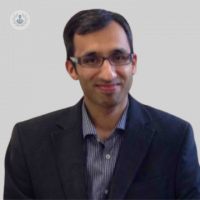Is it possible to prevent tinnitus?
Written by:Tinnitus is often described as a ringing in the ears which can disturb your sleep and ability to concentrate and may affect your wellbeing if not carefully managed. In this article, leading consultant ear, nose and throat (ENT) surgeon Mr Abdul Qureshi shares his expertise on the known causes of tinnitus, how the condition typically presents and what can be done to prevent damage to your hearing.

What is tinnitus?
Tinnitus is the perception of sound that does not have an external source, so other people cannot hear it. It is commonly described as a ringing sound, but some people hear other types of sounds, such as roaring or buzzing. Although there is no cure for tinnitus, most patients are able to improve their symptoms gradually with treatment.
What are the early signs or symptoms of tinnitus?
The symptoms of tinnitus include:
- ringing, roaring, buzzing, hissing, or whistling sound in the ear that often matches your heartbeat
- heart palpitations or feeling that your heart is racing
- light-headedness
If you are experiencing new, severe, or persistent symptoms, it's important to see a doctor.
Why does tinnitus occur?
It's not always clear what causes tinnitus, but it's often linked to some form of hearing loss. The most common cause of tinnitus is damage in the inner ear. It can also be related to:
- damaged blood vessels in the brain near or around the ear
- age-related hearing loss
- high blood pressure
- overactive thyroid
- tumours in head and neck
- clogged arteries around the middle or inner ear
- anaemia
Is it possible to prevent tinnitus?
Tinnitus is not always preventable but there are some things you can do to help protect your hearing and the health of your ears. Recommendations include:
- wearing earplugs or earmuffs when you're exposed to loud music or noise
- keeping the volume on your headphones or earbuds low
- taking breaks from loud noise
- taking steps to manage stress
- avoiding caffeine and other stimulants
How is tinnitus treated?
There is no cure for tinnitus, but there are treatments that can help people to manage their symptoms. Some patients find sound therapy very beneficial, which involves listening to sounds to help mask the ringing heard in the ears.
In addition, tinnitus retraining therapy (TRT) can be used to train your brain learn to ignore the ringing in your ears and cognitive behavioural therapy (CBT) can give you strategies to help you to cope with the condition. Some medications may also help relieve symptoms associated with tinnitus, such as anxiety or depression.
If you are concerned about tinnitus and wish to schedule a consultation with Mr Qureshi, you can do so by visiting his Top Doctors profile.


